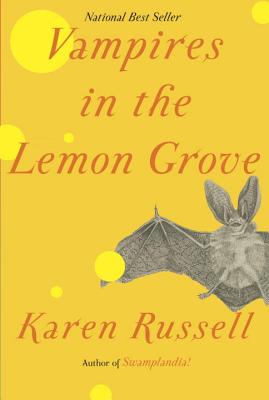by Karen Russell
I was introduced to Ms. Russell’s work through her Pulitzer Prize finalist debut novel, Swamplandia! I was immediately seduced by her imaginative use of language, as well as the quirky tale and endearing central character. I came to Vampires in the Lemon Grove, her second story collection, expecting more of the same except, you know, shorter. I don’t know that my expectations were fully met.
Ms. Russell writes beautifully—so no complaints there. She has an idiosyncratic and evocative style, and if you’ll indulge me, here are a few quotes:
- “Marcy McFadden was gone. But Beverly could read the Braille of her mother’s curved spine—it was composed in the unspeakable, skeletal language that she had learned at school.”
- “Beverly once read a science magazine article about bioluminescence, the natural glow emitted by organisms like fireflies and jellyfish, but she knows the dead also give off a strange illumination, a phosphor that can permanently damage the eyes of the living. Necroluminescence—the light of the vanished. A hindsight produced by the departed’s body. Your failings backlit by the death of your loved ones.”
- “It was a terribly embarrassing voice—a weak white grasshopper species that we would have tried to kill, had it belonged to a fellow child.”
It was the collection’s second story, “Reeling for the Empire,” that—for lack of a better description—completely freaked me out. I’m not going to describe it at all; it’s better for you to just discover it exactly as the author has presented it. What I will say is that it’s deeply, deeply weird and nightmarish. But also kind of brilliant and… and… What kind of sick mind thinks up this stuff? That is where I began to feel disquieted and also provoked. Ms. Russell’s stories provoked strong reactions from me. I’m not sure they were entirely positive reactions, but I could always appreciate the talent, intelligence, and imagination that Ms. Russell displayed.
I don’t feel like it would be productive to write up summaries of the eight stories that make up this collection. Ultimately, a plot synopsis wouldn’t be very illustrative. It was interesting for me to read this collection virtually back-to-back with George Saunders’ much-vaunted collection, Tenth of December. There were interesting aspects to their work to compare and contrast, which was not surprising as Mr. Saunders is often listed as influencing Ms. Russell. Speaking broadly, reading him was a more joyful experience. But for better or worse, it’s her tales that will probably have the greater staying power. Ms. Russell’s stories disturbed me at the same time as they entertained me. I had confusing emotional responses to her work. I suspect that she would be very pleased to have aroused such reactions.

Well this will be going on the TBR...
ReplyDeleteGood! I need someone to discuss these stories with, LOL.
ReplyDeleteIncidentally, I also just read Jess Walter's debut story collection, We Live in Water, which goes on sale tomorrow, I believe. It is also excellent, but totally differnt from Russell and Saunders.
I need to bury myself in a good, long novel-length work!